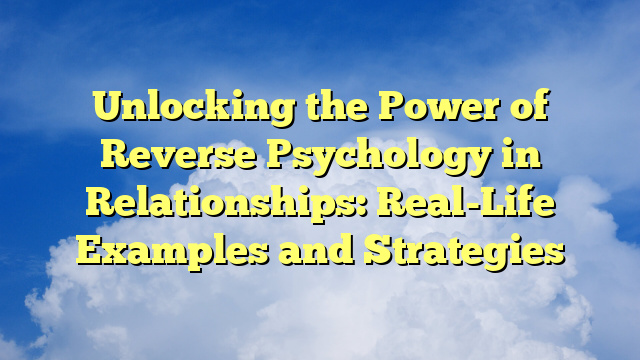Unlocking the Power of Reverse Psychology in Relationships: Real-Life Examples and Strategies
Unlocking the Power of Reverse Psychology in Relationships: Real-Life Examples and Strategies
Introduction
Reverse psychology is a powerful tool that can be used in various aspects of life, including relationships. It involves using indirect tactics to influence someone’s behavior by suggesting the opposite of what you actually desire. While it may seem counterintuitive, reverse psychology can be highly effective in certain situations. In this article, we will explore real-life examples and strategies for unlocking the power of reverse psychology in relationships.
Understanding Reverse Psychology
Reverse psychology works by tapping into the natural human tendency to resist being controlled or manipulated. When someone feels like they are being pushed or coerced into doing something, they often react by doing the opposite. However, when reverse psychology is employed, the person feels a sense of autonomy and willingly chooses to do what is desired, even though it was indirectly suggested.
It is important to note that reverse psychology should be used ethically and with good intentions. Manipulating or deceiving someone for personal gain is not the purpose of reverse psychology. Instead, it should be used as a tool to encourage positive behavior or change in a relationship.
Real-Life Examples
Let’s explore some real-life examples of how reverse psychology can be applied in relationships:
- Encouraging Communication: Instead of directly asking your partner to open up about their feelings, you can use reverse psychology by saying something like, “I don’t think you’re ready to have an honest conversation about this.” This statement can trigger a desire in your partner to prove you wrong and initiate a meaningful discussion.
- Increasing Attraction: If you want to increase your partner’s attraction towards you, you can use reverse psychology by subtly suggesting that you are not as interested in them anymore. This can create a sense of longing and make them more eager to win your attention and affection.
- Encouraging Independence: If your partner is overly dependent on you, you can use reverse psychology by expressing how much you admire their independence and how you value their ability to make decisions on their own. This can motivate them to become more self-reliant and less reliant on you.
- Resolving Conflicts: Instead of directly confronting your partner during a conflict, you can use reverse psychology by saying something like, “I don’t think we can ever resolve this issue.” This can trigger a desire in your partner to prove you wrong and find a resolution to the conflict.
Strategies for Using Reverse Psychology
While reverse psychology can be a powerful tool, it is important to use it strategically and with caution. Here are some strategies to consider:
- Know Your Partner: Understand your partner’s personality, preferences, and triggers. This will help you tailor your reverse psychology tactics to be more effective.
- Timing is Key: Choose the right moment to employ reverse psychology. It should be used when your partner is in a receptive state of mind and open to suggestion.
- Be Subtle: Reverse psychology works best when it is subtle and indirect. If it is too obvious, your partner may become resistant or suspicious of your intentions.
- Stay Genuine: While using reverse psychology, it is important to remain genuine and authentic. Your partner should feel that your intentions are sincere and not manipulative.
- Communicate Openly: After employing reverse psychology, it is crucial to have open and honest communication with your partner. This will help build trust and ensure that both parties are on the same page.
Conclusion
Reverse psychology can be a powerful tool in relationships when used ethically and with good intentions. By understanding the principles behind reverse psychology and employing the right strategies, you can unlock its power to influence positive behavior and foster a healthier relationship. Remember to always communicate openly and honestly with your partner, as trust and mutual understanding are the foundations of any successful relationship.

